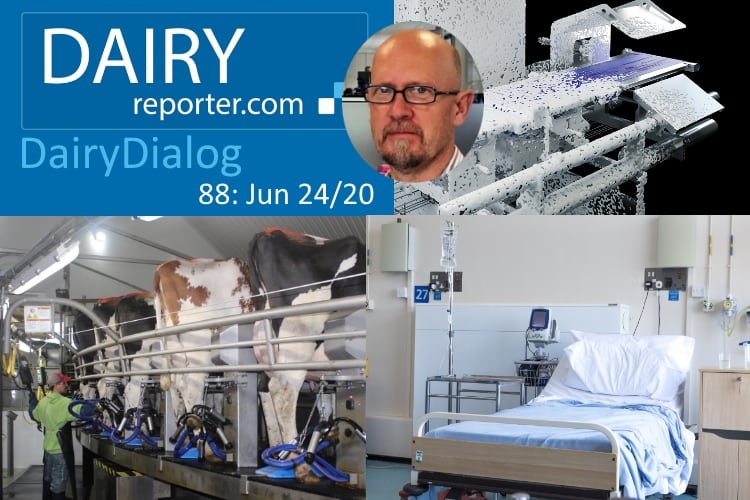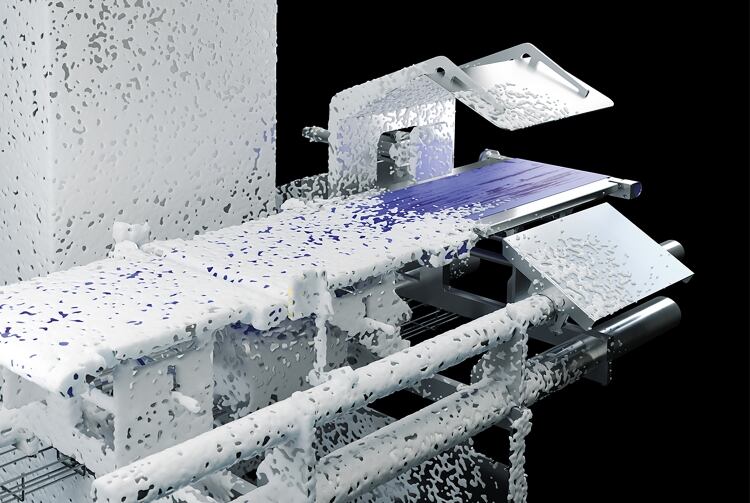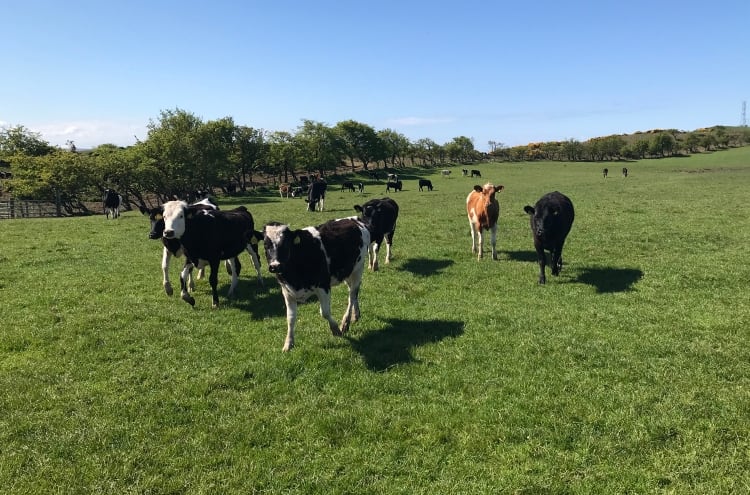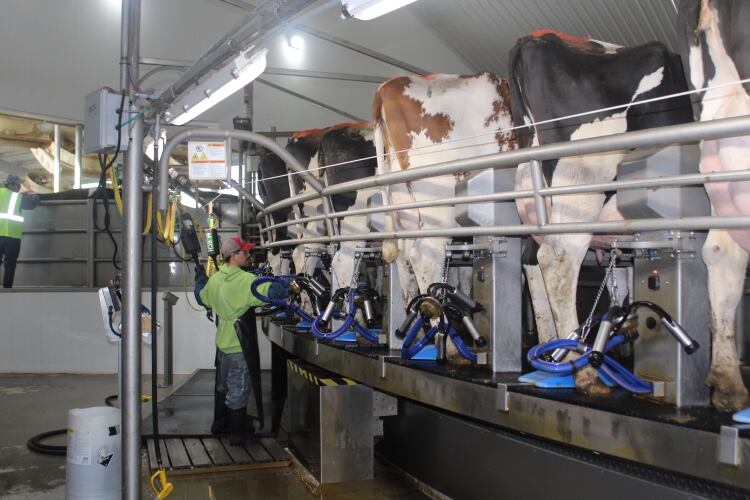And there is the weekly look at the global dairy markets with Charlie Hyland from INTL FCStone.
[Images: Hospital - Getty Images/Peter Horrox; equipment – Mettler-Toledo; milking – MVP Dairy]
Nutricia supports new research initiatives to aid COVID-19 patient recovery after hospital discharge
Nutricia, part of food, beverage and nutrition company Danone, is supporting research by independent medical professionals to define guidelines for nutritional care for COVID-19 patients recovering after ICU discharge.
Beginning with a research project in Italy, over the coming weeks further clinician-initiated research projects in 16 countries around the world will be supported by Nutricia with grants totalling approximately €1m ($1.13m).
Nutricia is also supporting healthcare organizations in different countries through the donation of medical nutrition products enriched with calories and proteins, designed to help patients recovering from a serious illness, such as COVID-19, regain lost weight and strength.
The symptoms, characteristics and treatment options of the COVID-19 disease are becoming increasingly understood as the global pandemic progresses; but the rehabilitation requirements for those who have overcome severe COVID-19 infections in ICU are not yet as widely known. The average duration of stay in ICUs (in the US and Europe) is generally two days. However, critically ill COVID-19 patients may be admitted to ICUs for as long as two weeks.
ICU patients can lose as much as a kilogram of muscle mass per day, the company said, and so an elongated stay can result in severe depletion of muscle mass, strength and resilience. Loss of lean body mass can lead to significant effects, including impaired immune function, overall weakness, development of wounds and/or pressure ulcers and even increased mortality rates.
As a result, people leave the hospital weakened, sometimes hardly able to undergo rehabilitation programs and unable to perform the activities of daily living like personal hygiene, preparing and eating food or going outside for a walk.
Currently there is limited COVID-19 specific guidance on nutritional care after hospital discharge to address the needs of recovering COVID-19 patients.
Dr Riccardo Caccialanza, Head of Dietetics and Clinical Nutrition Unit at the IRCCS Policlinico San Matteo Foundation, Pavia, Italy, is one of the first medical experts globally to begin research into the impact of nutrition and physical exercise in regaining functional ability and improving quality of life as patients start their recovery from COVID-19 at home.
Dr Caccialanza, who has first-hand experience in overseeing the nutritional care for hospitalized COVID-19 patients, is now signalling the need to continue nutritional support as patients recover after hospital discharge.
He said, “In Italy so far we have seen the complications related to this loss of lean body mass can lead to lengthier patient recovery times – and this requires more resources from already stretched healthcare systems. There is a need for clinical guidance to optimize the recovery of patients and help them regain the ability to perform day-to-day tasks at home. Patients need to have the strength and energy to do those things that matter most to them.”
Patrick Kamphuis, senior medical affairs director at Nutricia said, “As with many other severe illnesses, discharge from hospital after a COVID-19 infection is only the start of recovery; and unfortunately, the importance of adapted nutrition and exercise in the recovery process is often under estimated.
“Through these grants for independent research by healthcare professionals, and medical nutrition product donations to healthcare organizations, we hope to contribute to patient recovery from COVID-19 and support healthcare systems across the world in delivering better care outcomes.”
Nutricia’s COVID-19 support initiatives include ongoing education programs by and for healthcare professionals about the role of nutrition in patient care and recovery, as well as support resources for patients and carers.
This latest support initiative by Nutricia for healthcare professionals is in addition to local aid efforts initiated since the start of the COVID-19 pandemic. These have included donation of medical nutrition products or personal protective equipment to healthcare organizations in need of support.
Mettler Toledo launches new washdown Checkweighing series
Mettler Toledo Product Inspection has launched a new series of washdown resistant checkweighers for precision weighing applications in food manufacturing environments.
The new equipment series is specifically designed for use in applications that require stringent cleaning processes that use caustic cleaning agents to combat bacterial contamination risks, without compromising their weighing accuracy.
The ideal applications for the new washdown checkweighers include dairy products as, during the food production processes, liquid product ingredients could spill over and contaminate conveyor belts, or other parts of the machinery, which have direct or indirect contact with the product.
The new washdown checkweighers series feature sloped surfaces to discourage liquid and debris collection, avoiding bacterial contamination risks, while conveyor belts can be removed quickly and easily for cleaning. The series also features an open-frame design with four feet on the floor to provide easy access for washdown purposes.
The systems are IP69 tested and are resistant to most caustic detergents and disinfectants in line with the ECOLAB Material Compatibility Test. This includes the checkweighers’ touchscreens, which do not need to be removed or covered during cleaning procedures, resulting in reduced downtime for regular cleaning processes.
The washdown checkweighers adhere to global weighing regulations and the Measuring Instruments Directive (MID). The series also comply with regulations governing conveyor materials expected to come into contact with food, including Regulation (EC) 1935/2004 and Regulation (EU) 10/2011, which supports the customer in their need to meet US Food & Drug Administration (FDA) standards.
"In the food production industry, there is nothing more crucial than keeping consumers safe from contamination – bacterial or otherwise," Dr Jürgen Kress, general manager at Mettler-Toledo Garvens.
"It is extremely important that production equipment is able to stand up to the rigorous cleaning routines required to maintain a hygienic environment without sacrificing accuracy."
The series includes the following two new lines.
C33 PlusLine Washdown Checkweigher
The C33 PlusLine features self-adjusting elastic belts that remove the need for tensioning. If needed, cleaning with the parts in place is possible in most set-ups, while the flip-up design of the conveyors allows access to all critical areas.
The C33 PlusLine features a 12" touchscreen monitor at the front of the system to ensure worker safety. This is also IP69 rated, which means it does not need to be covered or removed during cleaning. The system provides runtime data and statistics in more than 30 languages, with additional accessibility and options available.
C35 AdvancedLine Washdown Checkweigher
The C35 delivers precise weighing on a stable weighing platform resistant to high-pressure washdown and most caustic detergents. The system frame is designed according to outlined hygienic principles, with easy access for cleaning and sloped surfaces to discourage liquid collection.
The system supports speeds of up to 250 packs per minute and a weighing range from 25g to 7 kg.
The C35 also reduces maintenance-related downtime as it takes less than a minute to remove the driving unit completely with the minimal use of tools. Its 15" touchscreen interface is also fully washable along with the rest of the system.
The weighing software supports IoT/Industry 4.0 initiatives using open interfaces such as OPC UA, Pack ML and Fieldbus.
MVP Dairy receives B Corp certification
Ohio-based MVP Dairy LLC has earned B Corp TM Certification from the nonprofit B Lab, becoming one of the few dairy farms in the world to achieve this certification.
As a B Corp, MVP Dairy publicly commits to upholding a purpose-driven business and supporting a global economy that benefits all.
Certified B Corps are businesses that have opted to become part of a culture shift toward the concept of using business as a force for good, redefining "success" by using profits and growth as a means to help build a more inclusive, sustainable world.
The certification assessment reviews every aspect of a business, including its supply chain, to verify its social and environmental business practices and its impact on its workforce and community.
"As fourth generation farmers, we know the care we provide to our cows, land, and team members today can help create a more sustainable world tomorrow," Ken McCarty, co-owner of MVP Dairy, said.
"Using our farms to help strengthen our communities has never been more important and we are incredibly proud to join a movement that holds businesses to a higher standard of accountability.”
To obtain the B Corp Certification, companies must complete a B Impact Assessment that measures a company’s performance in governance, workers, customers, community, and the environment. They must earn an audited minimum score of at least 80 out of 200 possible points and recertify—with the aim to continuously improve—every three years.
"We are a mission-driven family farm that constantly strives to improve our farming practices and how we do business," McCarty said.
"This designation demonstrates our ongoing commitment to put innovation and progress over profit while helping us identify ways we can achieve more for our people and planet.”
Although MVP Dairy is one of the few dairy farms in the world to earn this achievement, they are joining other dairy-related companies including Ben and Jerrys, Jeni's Ice Cream, Cabot Cheese and their long-time partner and world's largest B Corp, Danone North America.
“It is more critical than ever that companies demonstrate their purpose in society, and joining Danone North America in the B Corp movement is a major achievement for MVP Dairy,” said Emmanuel Faber, chairman and CEO of Danone.
“We believe that success in business can be redefined by building a more resilient economy that serves all stakeholders. As we continue our B Corp journey globally, as well as adopt the French “Enterprise à Mission” model, we’re focused on close collaboration with our partners to drive real, systemic change and create impact at scale.”
MVP Dairy completed the certification earlier this year and joins more than 3,300 for-profit companies across 160 industries in 71 countries that are meeting the standards of transparency and accountability in environmental and social performance.
Anthea Kelsick, co-CEO of B Lab US/Canada said, “We are proud to welcome MVP Dairy to the community of Certified B Corporations and celebrate their long-held commitment to using business as a force for good.
“Their regenerative and sustainable practices are exemplary, and their partnership with fellow B Corp Danone North America illustrates the power of responsible supply chains and mission-driven collaboration. As we've seen throughout the COVID-19 crisis, it's never been more important for businesses to work together to take action and lead the way in building a more inclusive and resilient economy.”
Dairy companies in high-risk category of FAIRR pandemic report
Global dairy companies are among 44 firms criticized by investors for their inability to prevent the emergence of new zoonotic diseases.
The report, “An Industry Infected,” was produced by FAIRR, a global investor network supported by institutional investors managing assets of more than $20tn.
In the report, 44 of the world’s 60 largest meat, dairy and fish companies were graded high risk in a Pandemic Ranking that assesses performance from worker safety to food safety. None of the 60 companies studied were awarded a low-risk ranking.
The report did not include other global dairy companies and cooperatives, as FAIRR told DairyReporter, “The scope of the Index focuses on listed companies involved in breeding, processing, distributing and selling meat, dairy or aquaculture products, reflecting (approximately) the 60 largest listed livestock and aquaculture companies by market cap.”
It added that FAIRR's analysis and evaluation of the 60 companies is “very detailed, therefore stopping at 60 companies is a matter of resourcing.”
Results
In the wake of the economic and human health issues caused by the coronavirus pandemic, FAIRR said it found 73% of the world’s largest animal protein producers (collectively worth over $220bn) score as “high risk” in its ‘Pandemic Ranking’.
Their performance across a set of seven criteria, which FAIRR said are vital to preventing future zoonotic pandemics – antibiotics stewardship, managing deforestation and biodiversity loss, working conditions, animal welfare, waste and pollution, food safety and investment in alternative proteins – demonstrates intensive animal production is at serious risk of creating and spreading a future pandemic, according to the group.
FAIRR told DairyReporter it conducted company assessments using publicly available information, including annual and sustainability reports and company websites.
“Each risk factor is made up of numerous detailed criteria, primarily around a company’s performance, policy and disclosure,” FAIRR said.
“For example, a company’s score on antibiotic use includes whether the company explicitly states it is reducing its antibiotic use, whether the company uses antibiotics routinely, whether medically important antibiotics are used, etc.”
All 60 companies were given an overall ranking of ‘low’, ‘medium’, ‘high’ risk’ or ‘best practice’, A full methodology is available in the report.
Of the companies primarily dedicated to dairy included in the ranking, Fonterra Co-operative Group Ltd fares the best, with a medium risk ranking of 56.
China Mengniu Dairy Company Ltd had a high-risk score of 26, Vietnam Dairy Products JSC (Vinamilk) was also high risk with a score of 21, and Almarai Co JSC’s score of 16 was also high risk. Inner Mongolia Yili Industrial Group Ltd and China Modern Dairy Holdings Limited were also labeled high risk, with scores of 15 and 11 respectively. Sanyuan Group, also located in China, received a 13 score.
Jeremy Coller, founder of FAIRR and CIO of Coller Capital said, “Factory farming is both vulnerable to pandemics, and guilty of creating them. It’s a self-sabotaging cycle that destroys value and risks lives.
“To avoid causing the next pandemic, the meat industry must tackle lax safety standards for food and workers alike, closely confined animals and overused antibiotics. This will disrupt a supply chain already cracking from fundamental land, water and emissions constraints.”
The ‘Pandemic Ranking’ uses data collected by the Coller FAIRR Protein Producer Index and aims to be a tool investors can use in ESG integration and active ownership strategies, to identify where the gaps are to achieving resilience in the global food chain and to mitigate future disasters.
Coller said, “The results of the Pandemic Ranking will leave a sour aftertaste for investors in the $1.5 trillion meat, fish and dairy industry.”
FAIRR’s research also reflects on opportunities in the alternative protein sector, following steep sales growth of plant-based proteins. In the US in one week in April, sales of plant-based meat alternatives were up 200% year on year, and shares of Beyond Meat have risen over 80% this year.




